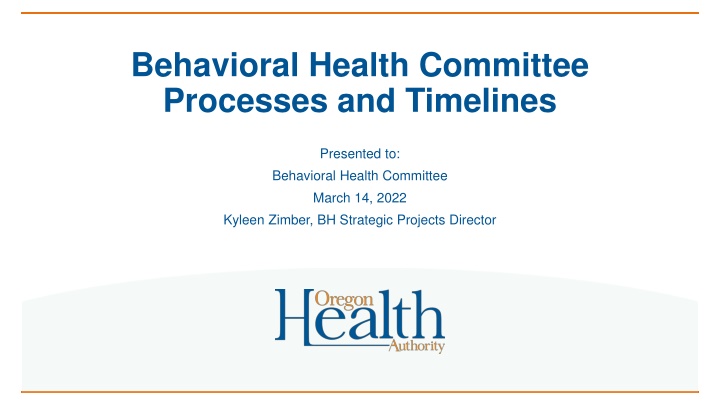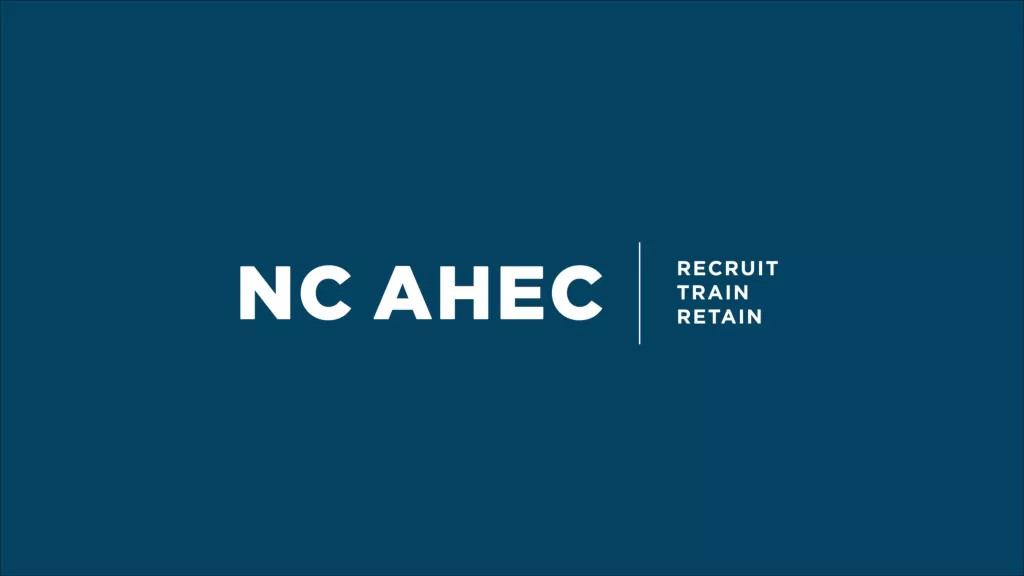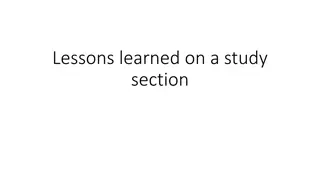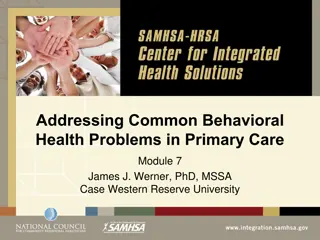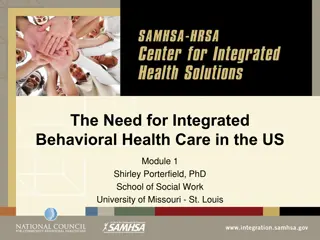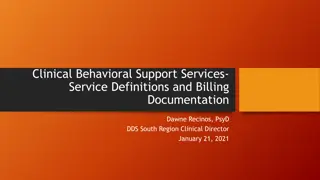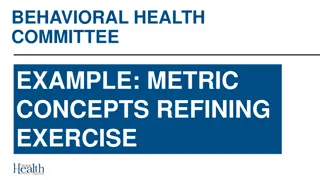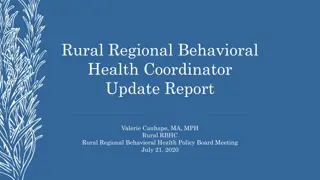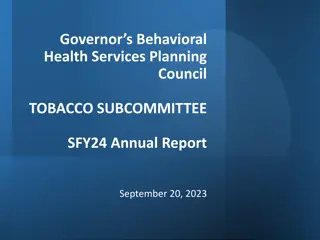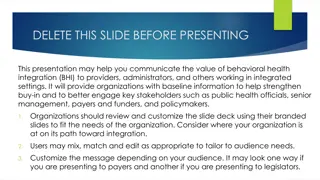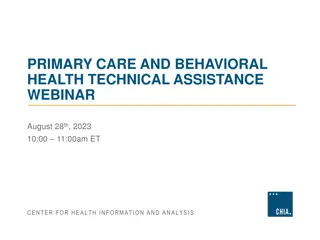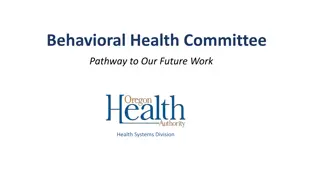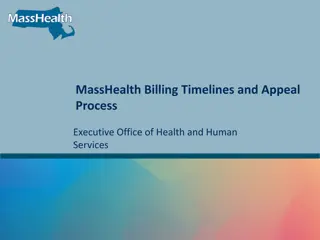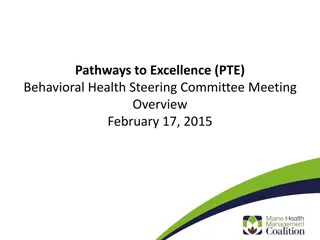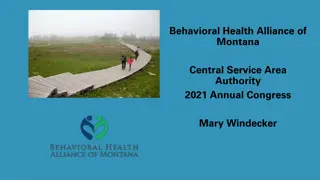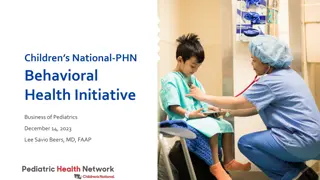Behavioral Health Committee Processes and Timelines Summary
Focus on refining metric concepts for legislative and organizational requirements through committee processes. Meetings involve presenting synthesized information, refining key topics, and developing metrics. The timeline spans from February to May, covering various aspects like worker retention, access to services, fair rates, and addressing inequities. The goal is to enhance behavioral health resources and promote equitable practices.
Download Presentation

Please find below an Image/Link to download the presentation.
The content on the website is provided AS IS for your information and personal use only. It may not be sold, licensed, or shared on other websites without obtaining consent from the author.If you encounter any issues during the download, it is possible that the publisher has removed the file from their server.
You are allowed to download the files provided on this website for personal or commercial use, subject to the condition that they are used lawfully. All files are the property of their respective owners.
The content on the website is provided AS IS for your information and personal use only. It may not be sold, licensed, or shared on other websites without obtaining consent from the author.
E N D
Presentation Transcript
Behavioral Health Committee Processes and Timelines Presented to: Behavioral Health Committee March 14, 2022 Kyleen Zimber, BH Strategic Projects Director HEALTH POLICY AND ANALYTICS DIVISION
Overview Cleaning up and getting specific about the metric concepts so they can go to OHA (Health Policy and Analytics Division) to be turned into metrics that meet legislative and organizational requirements Continuing process from previous meeting, modified in response to feedback we heard from you, to clarify metric concepts 2 2 2 2 2
Proposed plan for each BH Committee session Staff will present a brief and preliminary synopsis of the previous meeting Staff will provide data or context setting for the next topic We will take the bulk of each meeting to work through the EZBoard, with added dialogue, using the same refined set of questions each time on one of the top concepts that you rated highly Once we get through this process of you reviewing the concepts that were most highly ranked, OHA staff will bring back the reworked metric concepts to shape them into metrics that meet legislative and organizational requirements The Committee will review the revised metric concepts which will then jump start the conversation on incentives 3 3 3 3 3
Draft Timeline FEBRUARY 28: Refine non-jail drop off / walk-in services MARCH 14: Present synthesized information from previous meeting, Refine worker retention/turnover MARCH 28: Present synthesized information from previous meeting, Refine availability of culturally specific care APRIL 11: Present synthesized information from previous meeting, Refine (combine first) 1) time to access services when needed and 2) time to next available appointment 4 4 4 4 4
Draft Timeline APRIL 25: Present synthesized information from previous meeting, Refine accessibility of behavioral health resources for justice-involved individuals MAY 9: Present synthesized information from previous meeting, Refine fair rates for behavioral health services including substance use treatment MAY 23: Present synthesized information from previous meeting, Refine address the inequity between communities of color when naming and communicating promising practices; there needs to be an increase in the practices reflecting African American communities. 5 5 5 5 5
Draft Timeline JUNE 6: Present synthesized information from previous meeting, Refine 1) supportive housing conducive to positive growth and change is available, especially for folks leaving incarceration and leaving state hospital and 2) housing is available JUNE 20: Present total synthesized information, have a discussion, and vote Remainder of timeline to be completed and shared at March 28 meeting 6 6 6 6 6
Last weeks item 7 7 7 7 7
OREGONS BEHAVIORAL HEALTH WORKFORCE DATA CURRENT CONSTRAINTS: Lacking definition of a behavioral health care worker Limited wage information on behavioral health care workers No disaggregation on wage data for racial identity / ethnicity Exclusion of wage information for workers outside of the traditionally defined behavioral health care workforce Extremely limited data on non-licensed workers No statewide collection of turnover rates or retention rates
OREGONS BEHAVIORAL HEALTH WORKFORCE DATA Peer Worker (Addictions): $31,408 Median Wage; $30,000 $40,000 Majority Annual Wage (45%) (Mental Health and Addiction Certification Board of Oregon Wage, Benefit, and Student Loan Debt Analysis, 2018; Survey of OHA Registered Traditional Health Workers, 2021) Qualified Mental Health Associate (QMHA): $41,163 Median Wage (Mental Health and Addiction Certification Board of Oregon Wage, Benefit, and Student Loan Debt Analysis, 2018) Staff Turnover Rate: 40-60% with some Tri- County Providers (Tri-County Behavioral Health Providers Association, 2018) Majority female-identified (65%) Black / African American represented by 10% -- almost double the statewide demographic Healthy turnover rates should not exceed 12% (Annie E. Casey Foundation, 2015) For an agency with $35,500 annual salary and a 26% average turnover rate, each turnover costs $248,887 (National Child Welfare Workforce Institute) Increased turnover rates impact program outcomes (Child Welfare Information Gateway, 2016)
OREGONS BEHAVIORAL HEALTH WORKFORCE DATA OHA CURRENT EFFORTS: Behavioral Health Workforce Increasing Wages Report (House Bill 2086, 2021 2022) https://olis.oregonlegislature.gov/liz/2021R1/Measures/Overview/HB2086 $80 million to recruit and retain behavioral health care workers from BIPOC (Black, Indigenous, People of Color) communities or from rural areas and who can provide culturally specific services (House Bill 2949, 2021 Current) https://olis.oregonlegislature.gov/liz/2021R1/Measures/Overview/HB2949 $132 million to increase wages and bonuses for behavioral health care workers (HB 4004, 2022) https://olis.oregonlegislature.gov/liz/2022R1/Measures/Overview/HB4004
